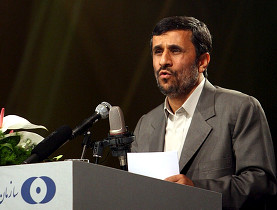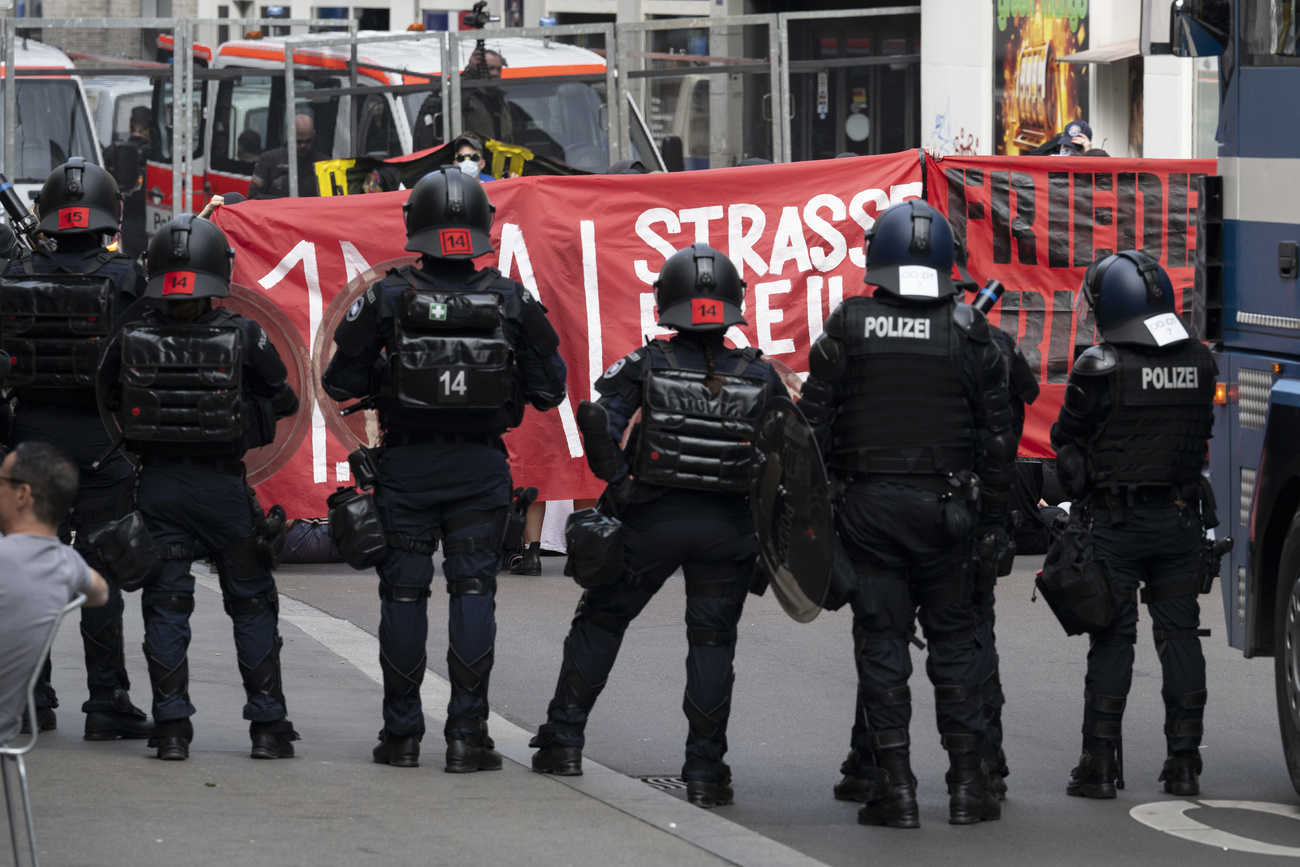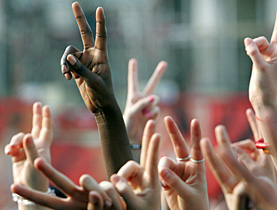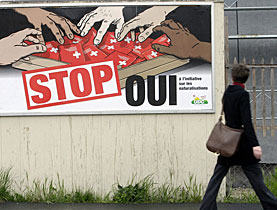Success of UN racism summit up in the air

With just two days to go before the start of the United Nations racism summit in Geneva, the meeting remains clouded by uncertainty.
The Durban Review Conference, or Durban II, continues to divide opinions and raise passions. The run-up has been bumpy, with states threatening to stay away and a behind-the-scenes race against the clock to reach consensus over a draft declaration.
Earlier this week UN spokeswoman Marie Heuzé set the tone for the Durban II meeting, which takes place from April 20-24.
“Hate speech and ethnic insults will be barred at next week’s United Nations conference on fighting racism and intolerance,” Heuzé said on Wednesday. “Definitely we will not allow what happened in Durban to happen here”.
The UN does not want a repetition of scenes that occurred at the 2001 World Conference Against Racism, Racial Discrimination, Xenophobia and Related Intolerance held in Durban, South Africa, when activist groups staged openly anti-Semitic marches and protests.
Durban II aims to seek progress on a global plan to address racism and discrimination that was agreed in 2001 but never properly monitored.
But the road to Geneva has been rocky. Western countries have been reluctant to commit themselves until they have a better idea of what the conference is setting out to do.
The presidency of the summit remained undecided for weeks and so far only 103 states are reported to have confirmed their participation, compared with 160 who were in Durban.
Israel and Canada have said they won’t attend the conference over concerns about a possible repeat of verbal attacks on Israel.
The United States and the European Union on Friday had still not decided whether to attend or go through with threats to boycott over Islamic nations’ demands to condemn Israel and call for a ban on defaming religion.
The presence in Geneva of Iranian President Mahmoud Ahmadinejad has added to fears by some countries that the conference could be diverted by Muslim countries into a verbal attack on Israel.
Sticking points
Delicate informal negotiations last week seem to have brought some progress but consensus had still not been reached on a number of issues, including incitement to religious hatred, free speech, monitoring mechanisms, an ad hoc committee dealing with additional anti-racism norms and a new anti-racism monitoring unit.
Although language referring to Israel has been removed from a declaration prepared for the Geneva meeting, diplomats believe that criticism of the Jewish state and calls to bar “defamation of religion” could still be raised during the proceedings.
On Wednesday the UN High Commissioner for Human Rights Navi Pillay urged states to take part in the conference, arguing that the Durban goals had “not been achieved”.
“Eight years on, anti-racism pledges and measures have not yet succeeded in relegating discriminatory practices and intolerance to the heap of history’s repugnant debris,” she told delegates.
Swiss participation
The meeting is also extremely important for Switzerland. Several weeks ago Swiss Foreign Minister Micheline Calmy-Rey warned: “It’s very important that Geneva’s name is not associated with a failure.”
The foreign ministry insists that the meeting is not taking place in Geneva at Switzerland’s request, but rather because the city is the UN’s European headquarters and the seat of the UN Human Rights Council.
Like most western states, the Swiss government laid down strict rules governing its participation. For Bern the summit should focus solely on examining the implementation of the Durban Declaration and Programme of Action and not review the whole process.
The meeting should not propose new anti-racism norms, neither should it focus on a specific geographic location, like the Israel-Palestine conflict.
Colonial past
Observers are divided over the likely success and impact of Durban II.
According to Adrien-Claude Zoller, the director of the non-governmental organisation Geneva for Human Rights, the pre-summit tensions over references to the Middle East and defamation of religion have overshadowed the human rights debate.
“The Geneva conference is supposed to monitor what has happened since Durban, but this question is hardly touched upon. This is therefore a missed opportunity to carry out a detailed evaluation of what has and hasn’t been accomplished since Durban 2001,” he said.
In negotiations over the draft declaration European countries have opposed all new initiatives to compensate victims of slavery. The EU also exerted pressure so that immigration issues should be watered down, claiming they have nothing to do with racism.
“The problem of a colonial heritage is still there, always raising frustrations and anger in former colonies. The former colonial powers have not sufficiently recognised this reality,” said Geneva consultant Yves Lador.
Upbeat
But it’s not all doom and gloom.
“There is a good chance they can get a good final document and follow-up process,” said Andrew Clapham, head of the Geneva Academy of International Humanitarian Law and Human Rights at Geneva University.
Clapham said he had been impressed to see practical ideas in the draft, like encouraging employers and national legislators to introduce anonymous recruitment processes.
Clapham and Zoller were also both supportive of the idea of an anti-racism monitoring unit, launched by the UN High Commissioner for Human Rights.
“We can also expect the UN Committee on the Elimination of Racial Discrimination, an extremely effective mechanism, to be strengthened, together with other procedures like special rapporteurs mandated by the UN Human Rights Council,” Zoller added.
But the real impact of such a conference can only be measured at the national level when civil society and governments integrate any final proposals, Zoller said.
But as of Friday only 2,500 NGO delegates had been officially registered, compared with 10,000 in Durban, and mobilisation appears scattered and divided.
swissinfo, Simon Bradley
The United Nations Durban Review Conference will take place in Geneva from April 20-24 and will evaluate progress towards the goals set by the World Conference against Racism, Racial Discrimination, Xenophobia and Related Intolerance in Durban, South Africa, in 2001.
The Review Conference is intended to serve as a catalyst to fulfil the promises of the Durban Declaration and Programme of Action agreed at the 2001 World Conference.
The 2001 conference was a landmark event in the struggle to improve the lives of millions of victims of racial discrimination and intolerance.
After a wide-ranging debate, the conference adopted by consensus the Durban Declaration and Programme of Action (DDPA), which provided a new framework for guiding governments, non-governmental organisations and other institutions in their efforts to combat racism, racial discrimination, xenophobia and related intolerance.
Among its measures for combating racism are strengthening education, fighting poverty, improving resources available to victims of racism, and bolstering respect for the rule of law and for human rights.
The UN notes that while progress has been made since 2001, there is a continued need for committed implementation of the DDPA.
The decision to convene the Durban Review Conference was made by UN Member States at a General Assembly meeting in 2006 and the UN Human Rights Council was asked to prepare the process.
According to the Federal Commission against Racism, Switzerland has shown mixed results.
There is still no national programme of action against racism or anti-discrimination law putting Art. 8 para. 2 of the Federal Constitution into practice, similar to the laws on equality between men and women and for the disabled.
There is very little victim-counselling available in cases of racial discrimination or state financial support for anti-racism NGOs.
The justice system is still hesitant when it comes to legal rulings over political expressions of racism and in cases of refused admittance.
Funds are lacking for federal anti-racism institutions and there is limited willingness to form a national human rights institution.
But certain positive steps have been taken. These include: the setting up of an ad-hoc anti-racism service within the interior ministry; new cantonal constitutions prohibiting discrimination; racism-awareness measures among cantonal police forces; the monitoring of racism and discrimination in Switzerland at the federal level and by NGOs; training on anti-racism in the health service; and greater equality in training and education by the standardisation of the school system (Harmos).

In compliance with the JTI standards
More: SWI swissinfo.ch certified by the Journalism Trust Initiative












You can find an overview of ongoing debates with our journalists here . Please join us!
If you want to start a conversation about a topic raised in this article or want to report factual errors, email us at english@swissinfo.ch.